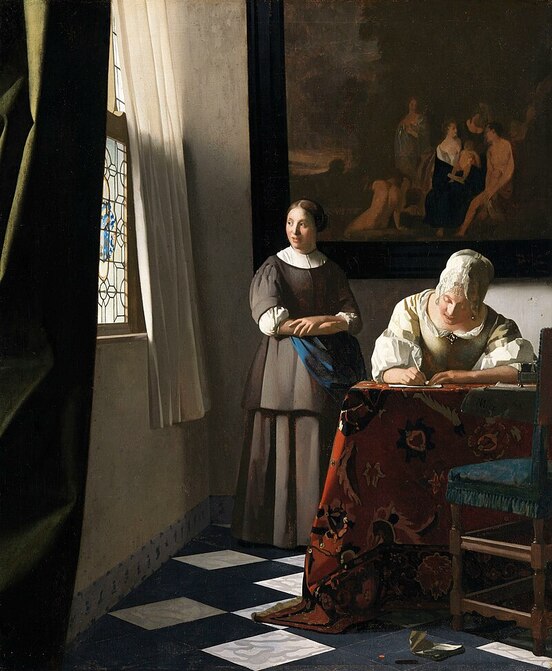|
Time in Those Houses who knows what importance / She attaches to the hours? Medbh McGuckian, “The Flitting”. The Flower Master. Oxford UP 1982 I It’s not the people or their looks, or their clothing. I am not an anthropologist of necklaces, Of silver jugs pouring milk. It’s mastery, for sure, but of something else. The windows, for example, and the quiet, background: Nuances of anthracite, dove or smoky grey. Around the furniture – yes – there’s light, obviously. He had theories for his out-of-focus maps, The studded chairs, but the Indian casket is shut. Jewels inside? Lapis lazuli maybe? His signature blue ultramarine, or a pale one, or Faded golden coins of yellow ochre. Maybe, Faded letters, read and read again, with just a drop of white. II Wandering around for hours, when did you notice it? The silence of these houses. The women you meet, And they are almost always women, are in that silence, Of that silence. Nothing otherworldly, nothing Really important; normal, domestic stuff. Nothing with a male, capital letter: books, a red hat, Curtains, sewing, carpet. Playing the spinet. They know they are being looked at, but keep on living. The others in a story – visitors, errand boys, husbands, Lovers, even children – removed for once. One can’t always be acting; there must be some pauses. Hours come and go, filled, or not, with those same things, But rearranged: one reads the spouse is dead, or the child, or alive. III The objects look the same, and yes, the subjects are minimal; One may say those casual hours – but cared for – are a naïve party, Almost mute, instead of serious daylight, but do we “know What importance we attach to the hours?”, the inevitable, indispensable Pause from history, from the madness that assaults life in you, From this opera house, this theatre with its expensive props, A globe for a funeral with fourteen pallbearers. He painted the absence, the waiting, what was that The canal, the ink, the basso continuo emerged from, The grace of ordinariness one only remembers after. He painted the time balanced between eyebrows. That moment. And now, sit or stand up, do what you have to. People The stuff of history, keep looking on; but you have to live. Massimiliano Nastri Wholly Unnecessary Notes See Gregor JM Weber, Johannes Vermeer. Faith, Light and Reflection. Rijksmuseum 2023. In 1664 Willem Thins, Vermeer’s brother-in-law, was locked up in an institution after an argument with his mother, and for attacking his pregnant sister with a stick. JM Montias,Vermeer and his milieu. A Web of Social History. Princeton UP 1989, pp. 160-9. A document recently emerged records 14 pallbearers for Vermeer’s funeral procession. Massimiliano Nastri: "An ever-receding biography: I spent my childhood in a German-speaking village on the Italian Alps, something redolent of Heidi, the cartoon. Three PhDs: is it an achievement? I only have few and minor publications. I work as a teaching assistant at Queen’s University Belfast, where I am revising a book about the interwar collapse of Centre-right parties and the rise of fascism. I am unsure whether it is more ominous or irrelevant. I am also guilty of an unpublished political novel, and of writing a second, to be equally unpublished. Proud of having some work published on Ink Sweat and Tears, Honest Ulsterman and Cyphers. Fifty years old."
1 Comment
Julia B Griffin
7/3/2023 08:36:06 pm
This is beautiful - you've touched on the heart of the painting, I think, or how it affects me anyway ...
Reply
Your comment will be posted after it is approved.
Leave a Reply. |
The Ekphrastic Review
COOKIES/PRIVACY
This site uses cookies to deliver your best navigation experience this time and next. Continuing here means you consent to cookies. Thank you. Join us on Facebook:
July 2024
|




